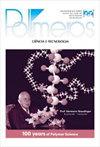A hybrid green composite for automotive industry
IF 1.4
4区 化学
Q4 POLYMER SCIENCE
引用次数: 2
Abstract
Hybrid composites were prepared using recycled polypropylene (rPP), dimension stone waste (Bege Bahia, BB) and coconut fiber (CF). Post-consumer the formulations of rPP/BB/CF and virgin PP, were processed in a Haake mixer. The films were characterized according to chemical, physical and mechanical properties. Multiple linear regression tests were used to develop mathematical models, which allow simulating the behavior of the composition of composite on mechanical properties. Density variations were associated with differences in particle packing and particle wall roughness. The impact resistance of rPP/BB/CF was slightly higher in the 70/10/20 wt% composite. SEM micrographs of the ternary (70/20/10 wt%) showed stronger traces of decohesion, allowing higher water absorption and reducing impact resistance. The response surface methodology suggest that the increase in the variable “coconut fiber content” is responsible for improving the mechanical properties of the composite. The ternary composite (70/10/20 wt%) was best for replacement of virgin PP.用于汽车工业的混合绿色复合材料
以再生聚丙烯(rPP)、维石废料(Bege Bahia, BB)和椰子纤维(CF)为原料制备杂化复合材料。消费后的配方rPP/BB/CF和原PP,在Haake混合器中进行加工。根据化学、物理和机械性能对膜进行了表征。采用多元线性回归测试建立数学模型,模拟复合材料组成对力学性能的影响。密度变化与颗粒堆积和颗粒壁粗糙度的差异有关。在wt%为70/10/20的复合材料中,rPP/BB/CF的抗冲击性略高。三元化合物(70/20/10 wt%)的SEM显微照片显示出更强的脱粘痕迹,允许更高的吸水性和降低抗冲击性。响应面方法表明,增加变量“椰子纤维含量”是负责改善复合材料的力学性能。三元复合材料(70/10/20 wt%)替代原生PP效果最好。
本文章由计算机程序翻译,如有差异,请以英文原文为准。
求助全文
约1分钟内获得全文
求助全文
来源期刊

Polimeros-ciencia E Tecnologia
化学-高分子科学
CiteScore
2.00
自引率
0.00%
发文量
14
审稿时长
6 months
期刊介绍:
Polímeros is a quarterly publication of the Associação Brasileira de Polímeros - ABPol (Brazilian Polymer Association), which publishes Review Articles, Original Articles and Short Communications, disclosing advances in the knowledge of Polymer Science and Technology.
 求助内容:
求助内容: 应助结果提醒方式:
应助结果提醒方式:


